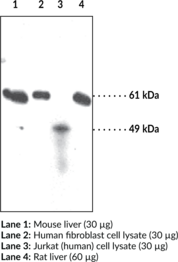Territorial Availability: Available through Bertin Technologies only in France
- Correlated keywords
- Acyl-coenzyme A: cholesterol acyltransferase-2 esters ACAT2 atherosclerosis antibodies antisera antiserum western blots blotting wb icc immunocytochemistry ihc immunohistochemistry immunoblotting SOAT2
- Product Overview:
Sterol O-acyltransferase 2 (SOAT-2), also known as acyl-coenzyme A:cholesterol acyltransferase-2 (ACAT-2), is an enzyme encoded by ACAT2 in humans that catalyzes the intracellular formation of cholesterol esters from cholesterol and long-chain fatty acyl-coenzyme A.{56232} It is constitutively expressed in the liver and small intestine and localized to the rough endoplasmic reticulum where it preferentially utilizes oleic acid (Item Nos. 90260 | 24659) or palmitic acid (Item No. 10006627) as fatty acid substrates for the synthesis of cholesterol esters, which are stored intracellularly or packaged into chylomicrons or VLDL and secreted into the blood stream. SOAT-2/ACAT-2 protein levels are increased in macrophages under various pathological conditions, including atherosclerosis.{56233} SOAT-2/ACAT-2 activity and protein levels are increased by cholesterol in vitro and in vivo, and ACAT2 expression is increased by the transcription factors hepatocyte nuclear factor 1-? (HNF-1-?) and HNF-4-? in Caco-2 cells and human liver, respectively.{56232} Genome-wide deletion of Acat2 reduces intestinal cholesterol absorption and decreases hepatic, but not plasma, total cholesterol levels in mice fed a high-cholesterol diet.{52780} Liver ACAT2 activity is negatively correlated with plasma HDL-C and ApoA1 in normolipidemic patients.{52781} Cayman’s SOAT-2/ACAT-2 Polyclonal Antibody can be used for immunofluorescence (IF), immunohistochemistry (IHC), and Western blot (WB) applications. The antibody recognizes the N-terminal region of SOAT-2/ACAT-2 at approximately 60 kDa from human, mouse, ovine, porcine, and rat samples.
Cayman Chemical’s mission is to help make research possible by supplying scientists worldwide with the basic research tools necessary for advancing human and animal health. Our utmost commitment to healthcare researchers is to offer the highest quality products with an affordable pricing policy.
Our scientists are experts in the synthesis, purification, and characterization of biochemicals ranging from small drug-like heterocycles to complex biolipids, fatty acids, and many others. We are also highly skilled in all aspects of assay and antibody development, protein expression, crystallization, and structure determination.
Over the past thirty years, Cayman developed a deep knowledge base in lipid biochemistry, including research involving the arachidonic acid cascade, inositol phosphates, and cannabinoids. This knowledge enabled the production of reagents of exceptional quality for cancer, oxidative injury, epigenetics, neuroscience, inflammation, metabolism, and many additional lines of research.
Our organic and analytical chemists specialize in the rapid development of manufacturing processes and analytical methods to carry out clinical and commercial GMP-API production. Pre-clinical drug discovery efforts are currently underway in the areas of bone restoration and repair, muscular dystrophy, oncology, and inflammation. A separate group of Ph.D.-level scientists are dedicated to offering Hit-to-Lead Discovery and Profiling Services for epigenetic targets. Our knowledgeable chemists can be contracted to perform complete sample analysis for analytes measured by the majority of our assays. We also offer a wide range of analytical services using LC-MS/MS, HPLC, GC, and many other techniques.
Accreditations
ISO/IEC 17025:2005
ISO Guide 34:2009
Cayman is a leader in the field of emerging drugs of abuse, providing high-purity Schedule I-V Controlled Substances to federally-licensed laboratories and qualified academic research institutions for forensic analyses. We are certified by ACLASS Accreditation Services with dual accreditation to ISO/IEC 17025:2005 and ISO Guide 34:2009.





